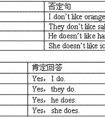Fillintheblankswiththerightformsofthegivenwords. 用所给单词的适当形式填空。1.Iwant(buy)agiftformyfamily.2. Theflag(cost)onedollar.3. "It'sagoodidea." s-六年级英语
题文
| Fill in the blanks with the right forms of the given words. 用所给单词的适当形式填空。 |
| 1. I want (buy) a gift for my family. 2. The flag (cost) one dollar. 3. "It's a good idea." says Li Ming (happy). 4. Li Ming said he (want) a ball. 5. The bus (come) soon. 6. How many (people) are there in the room ? 7. What time (do) the party begin ? 8. Do you remember (play) games yesterday ? 9. How many ____ (gift) do you need ? 10. Li Ming _____ (shop) in the store now. |
答案
| 1. to buy 2. costs 3.happily 4. wanted 5. is coming 6. people 7. does 8. playing 9. gifts 10. is shopping |
据专家权威分析,试题“Fillintheblankswiththerightformsofthegivenwords. 用所给单词..”主要考查你对 动词不定式,复数名词,集合名词,副词,一般现在时,动词单数第三人称,现在进行时,现在分词 等考点的理解。关于这些考点的“档案”如下:
动词不定式复数名词集合名词副词一般现在时,动词单数第三人称现在进行时,现在分词
考点名称:动词不定式
- 不定式定义:
由to+动词原形构成。不定式是一种非限定性动词。而非限定动词是指那些在句中不能单独充当谓语的动词,可分为不定式,动名词,现在分词和过去分词。
“动词不定式”由动词+不定式构成。动词不定式在句中可以作句子除谓语之外的任何句子成分。动词不定式的被动形式除了一般形式外还有其完成式和进行式。
常见的有:like / love,want,need,ask,help等。
例:I like to play with Tom. 我喜欢和汤姆玩。
I want to play with Tom. 我想和汤姆玩。
I like to eat dumplings. 我喜欢吃饺子。 - 动词不定式一般结构:
疑问词who,what,which,when,where,whether,how后可接不定式构成不定式短语,在句中作主语、宾语、表 语等。如:
①When to leave for London has not been decided yet. (不定式在句子中做主语)
②Mr. Smith didn't know whether to leave or stay there. (不定式在句子中做宾语)
③I asked Professor Xu how to learn English well. (不定式在句子中做直接宾语)
④The question was where to get the medicine needed. (不定式在句子中表语)
以上例句中疑问词+不定式部分,均可转换为相应的从句形式。如:
①When we shall leave…
③…how I could learn…
经常在这种结构中使用的动词有:
consider,decide,discover,explain,find out,forget,hear,know,lea rn,observe,understand,wonder等。 - 动名词与不定式的区别:
1 动名词与不定式的区别:
动名词表达的是:状态,性质,心境,抽象,经常性,已发生的
不定式表达的是:目的,结果,原因,具体,一次性,将发生的
2 接不定式或动名词,意义相同。
3在下列情况下,一般要用不定式:
①hate,like,love前有would(should)时,
如:I'd like to have a cup of coffee.
②当谓语动词begin,continue,start等是进行式时,
如:Thestudents are starting to work on the di fficult maths problem.
③begin,continue,start与know,understand等状态动词连用时,
如:I soon began to understand what was happening.
④.advise,allow,encourage,forbid,permit等动词后接动名词作宾语,或带不定式作宾语补足语。如:
Our teachers don't permit our/us swimming in the lake.
Our teachers don't permit us to swim in the lake.
4 部分动词后接不定式或动名词时,意义差别较大,应根据句子语境选择使用。
forget,remember,regret后接不定式,表示现在或未来的动作,接动名词表示动作已经发生。如:
Don't forget to post the letter for me.
Have you forgotten meeting her in Beijing Airport?
Remember to close the windows before you leave.
I remember writing him a letter a year ago.
We regret to tell you that all of you are not invited toattend the meeting.
They regretted ordering these books from abroad. - 省to的动词不定式:
(1)情态动词( 除ought 外,ought to意思是“应该”,是情态动词,只有一种形式,后边接动词不定式,to不能省略。
ought to没有人称和数的变化,后接动词原形可以表示现在、将来或过去将来,由时间状语或上下文决定。例如:
They ought to come tomorrow.他们明天应当来):
(2)使役动词 let,have,make:
(3)感官动词see,watch,look at,notice,observe,hear,listen to,smell,feel,find 等后作宾补,省略to。
注意:在被动语态中则to 不能省掉。
在使役动词中get除外(get sb. to do sth.)
I saw him dance.
=He was seen to dance.
The boss made them work the whole night.
=They were made to work the whole night.
(4)表示个人意愿或倾向的would rather,had better,might(just) as well:rather than置于句首时。
Rather than ride on a crowded bus,he always prefers to ride a bike.
(5)Why… / why not…:
(6)help 可带to,也可不带to,help sb (to) do sth:
(7)but和except:but前是动词do时,后面出现的动词用不带to的动词不定式。
(8)由and,or和than连接的两个不定式,第二个to 可以省去:
(9)通常在discover,imagine,suppose,think,understand等词后,可以省去to be:
He is supposed (to be) nice. 他应该是个好人。
(10)but作介词,后接不定式结构时,前面谓语动词部分若含有do的形式时,but后的不定式要省去to,否则要带to。
He wants to do nothing but go out.
He wants to believe anything but to take the medicine.
(11)当两个或多个不定时短语由连词and,but或or连接时,后一个或几个不定式符号to常省略。但若表示对比、对照关系时,则不能省略。
He wants to move to France and marry the girl.
The purpose of new technologies is to make life easier,not to make it more difficult.
- 最新内容
- 相关内容
- 网友推荐
- 图文推荐
上一篇:Don'tforget_________yourumbrella.[ ]A. takeB. takesC. takingD. to take-六年级英语
下一篇:Lynn invites me_____________ dinner with her.[ ]A. haveB. hasC. to haveD. having-六年级英语
零零教育社区:论坛热帖子
| [家长教育] 孩子为什么会和父母感情疏离? (2019-07-14) |
| [教师分享] 给远方姐姐的一封信 (2018-11-07) |
| [教师分享] 伸缩门 (2018-11-07) |
| [教师分享] 回家乡 (2018-11-07) |
| [教师分享] 是风味也是人间 (2018-11-07) |
| [教师分享] 一句格言的启示 (2018-11-07) |
| [教师分享] 无规矩不成方圆 (2018-11-07) |
| [教师分享] 第十届全国教育名家论坛有感(二) (2018-11-07) |
| [教师分享] 贪玩的小狗 (2018-11-07) |
| [教师分享] 未命名文章 (2018-11-07) |


![I want to ______________a science teacher one day![ ]A. beB. isC. are-六年级英语](http://www.00-edu.com/d/file/ks/4/1/58/2019-08-28/small0786c619dff6ea7cc013f1222e770e571566922364.png)
![Let's get ____ work![ ]A. on B. inC. to-四年级英语](http://www.00-edu.com/d/file/ks/4/1/58/2019-08-28/smallaeead033e0df4ab64ad92e4eecbe84ed1566922686.png)
![It's 10 o'clock. It's time_________go to school.[ ]A. toB. forC. of-四年级英语](http://www.00-edu.com/d/file/ks/4/1/58/2019-08-28/smallcbd5ebed803baef3505fe0cd5bc985461566922628.jpg)

